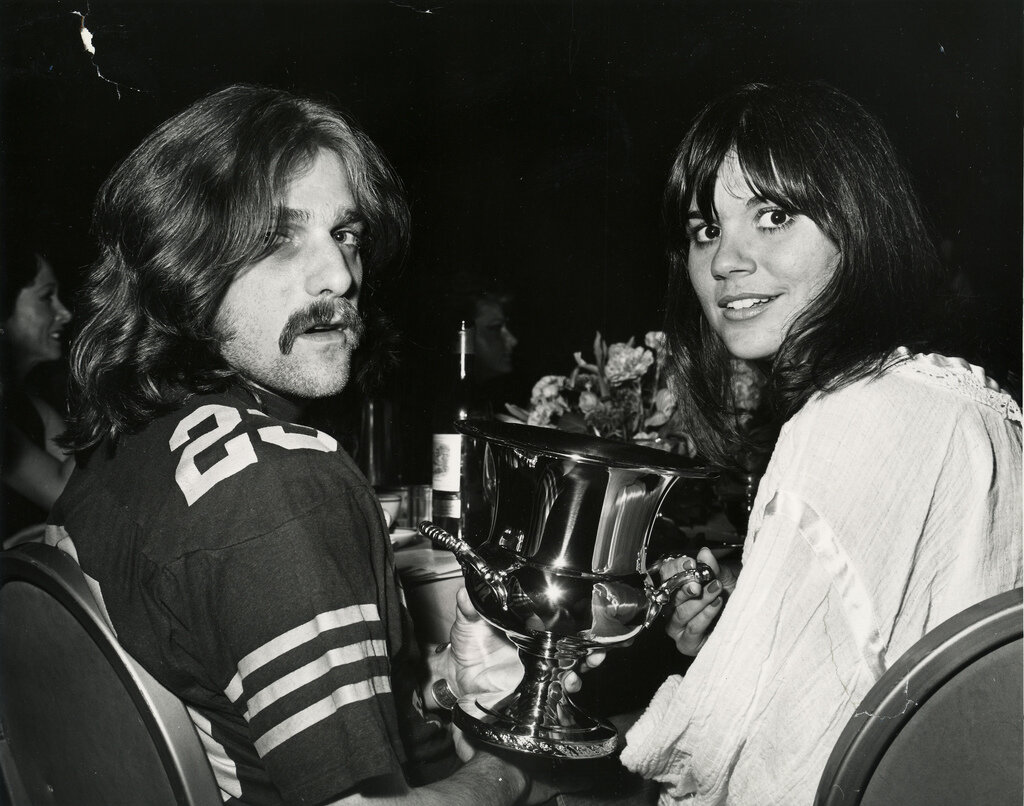Linda Ronstadt: The Sound of my Voice - A terrific, touching doc about a singer for all seasons
By Jim Slotek
Rating: A
An odd thing about Linda Ronstadt: The Sound of My Voice, the terrific, music-heavy doc about the big-voiced ‘70s pop-rock superstar, is how interviewees often talk about Linda Ronstadt as if she’s dead.
She isn’t. She hasn’t performed in a decade because Parkinson’s has robbed her of her control over that gorgeous instrument. But she’s occasionally on camera, physically weakened but not visibly shaking as she narrates details of her life.
But when people like best friend Emmylou Harris visibly tear up, they’re not mourning a friend, but that friend’s power.
Linda Ronstadt and then bandmate Glenn Frey in 1971.
At the movie’s end, Ronstadt contributes some wavering harmony to a Mexican folk tune by her nephew and brother. It seems like there may be enough there for an unprincipled promoter to prop her up for a “farewell” tour with tons of vocal backing.
But the Linda Ronstadt we meet in The Sound of My Voice is too much the perfectionist and author of her own career to ever participate in a charade.
For what it’s worth, you’re reading a review by someone who had a huge crush on Ronstadt in his teen years, and who was inspired in my early guitar adventures by songwriters I discovered via her covers (Warren Zevon, J.D. Souther, the McGarrigles).
What The Sound of My Voice does beautifully is wrap up that career in a package of work so eclectic, even her fans may have forgotten how many musical pathways she took. Even as a pop singer, she was simultaneously on the R&B, pop and country charts. She sang operetta (the Tony-nominated female lead in a production of The Pirates of Penzance on Broadway with Rex Smith and Kevin Kline), traditional Mexican and (practically over her label’s dead body) an album of standards produced by the late, great Nelson Riddle.
It occurs at a certain point that Ronstadt was kind of the Meryl Streep of pop music, capable of taking on any vocal role and making it sound like she was born to it.
Directors Rob Epstein and Jeffrey Friedman start at the beginning, with today’s Ronstadt narrating her childhood with unwavering clarity. She recalls a life of constant song in Tucson, Arizona, the daughter of a machinery merchant who performed part-time in a mariachi band and a mother whose tastes ran to opera.
After making local headlines with a folk trio with her brother and a guitarist friend, Bobby Kimmel, she moved to L.A. where she, Kimmel and guitarist Kenny Edwards founded Stone Poneys, whose hit Different Drum was a cover of a bluegrass tune, shaped by the studio to all but make her bandmates irrelevant.
The doc doesn’t zero in on any resentment over the label’s insistence that they only wanted her (she almost goes into detail in a clip from the Dick Cavett Show, but stops herself).
But soon she evolves into, not only the most powerful voice in music at the time, but practically a source of the folk-country-rock movement itself.
Her early, post-Stone Poneys band had Don Henley on drums and Glenn Frey on guitar (realizing their pre-Eagles compatibility while sharing lousy motel rooms on the road). Souther was her live-in boyfriend, who would become one of the genre’s most influential songwriters (he’d have a hit with You’re Only Lonely, she’d cover Faithless Love and White Rhythm & Blues). She took the fledgling and fragile Emmylou Harris under her wing on the heels of her disastrous relationship with the doomed Gram Parsons. Ronstadt also became a touring partner of choice with Jackson Browne.
But perhaps most inspiring was how she went out of her way to bond with the few women making their mark in the male-dominate music scene at the time – Harris, Bonnie Raitt, Karla Bonoff. When she, Harris and Dolly Parton recorded the album Trio, we are informed by Johnny Carson in the intro for their Tonight Show appearance, that they had a combined 45 Grammy nominations.
And the movie would be remiss if it ignored Ronstadt’s one great brush with non-musical fame – her relationship with then California governor Jerry Brown. There’s no question it was real (there’s an amusing concert clip of her dedicating My Boyfriend’s Back to Brown on his return from an out-of-state engagement). And it seemed to energize her politically. Interviewed by a patronizing British interview about her playing a concert in South Africa, she responded by rattling off countries she couldn’t play if horrible governments and policies were a deal-breaker (the U.S. among them).
Reviewers these days seem unforgiving of biographical documentaries that don’t play amateur psychologist. Linda Ronstadt: The Sound of My Voice doesn’t play that game. The Ronstadt we meet is unsure of herself in her youth, and particularly of her voice. But she seems to teach herself to play hardball after going along with the corporate bully-play that saw her early bandmates ejected as dead weight.
But, disillusioned by years on the road, almost everything she did post-‘70s was something people tried to talk her out of. Her Mexican songs from Canciones de mi Padre are thrilling. Her most commercial recording in her later career, the duet All I Need To Know with Aaron Neville may have been her best use of her natural talent for harmony. The Ronstadt we meet at the beginning of The Sound of my Voice has difficulty saying no. The one at the end doesn’t take no for an answer. At one point Dolly Parton makes a playful reference to Ronstadt being, “a pain in the ass” for her perfectionism, but there is no real dirt here. Just great archival footage and historical insight.
Linda Ronstadt: The Sound of My Voice. Directed by Rob Epstein and Jeffrey Friedman. Starring Linda Ronstadt, Emmylou Harris, Don Henley. Opens Friday, Sept. 27 at the Hot Docs Ted Rogers Cinema.

